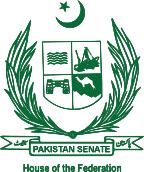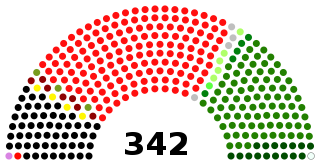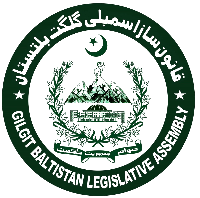Related Research Articles

The prime minister of Pakistan is the head of government of Pakistan and designated as the "Chief Executive of the Islamic Republic".

Senate of Pakistan or Aiwān-e-Bālā Pākistān is the upper legislative chamber of the bicameral legislature of Pakistan, and together with the National Assembly makes up the Parliament.

The National Assembly or Aiwān-e-Zairīñ of Pākistān is the lower legislative house of the bicameral Majlis-e-Shura, which also comprises the Senate of Pakistan. The National Assembly and the Senate both convene at Parliament House in Islamabad. The National Assembly is a democratically elected body consisting of a total of 336 members, before 25th amendment they used to be 342 who are referred to as Members of the National Assembly (MNAs), of which 272 are directly elected members and 70 reserved seats for women and religious minorities. A political party must secure 137 seats to obtain and preserve a majority.

The Parliament of Pakistan is the federal and supreme legislative body of Pakistan. It is a bicameral federal legislature that consists of the Senate as the upper house and the National Assembly as the lower house. According to the constitution of the Islamic Republic of Pakistan, the President of Pakistan is also a component of the Parliament. The National Assembly is elected for a five-year term on the basis of adult franchise and one-man one-vote. The tenure of a Member of the National Assembly is for the duration of the house, or sooner, in case the Member dies or resigns. The tenure of the National Assembly also comes to an end if dissolved on the advice of the Prime Minister or by the president in his discretion under the Constitution.

Since its establishment in 1947, Pakistan has had an asymmetric federal government and is a federal parliamentary democratic republic. At the national level, the people of Pakistan elect a bicameral legislature, the Parliament of Pakistan. The parliament consists of a lower house called the National Assembly, which is elected directly, and an upper house called the Senate, whose members are chosen by elected provincial legislators. The head of government, the Prime Minister, is elected by the majority members of the National Assembly and the head of state, the President, is elected by the Electoral College, which consists of both houses of Parliament together with the four provincial assemblies. In addition to the national parliament and the provincial assemblies, Pakistan also has more than five thousand elected local governments.

The Constituent Assembly of India was elected to write the Constitution of India. It was elected by the 'Provincial Assembly'. Following India's independence from British Government in 1947, its members served as the nation's first Parliament.

Chaudhry Aitzaz Ahsan is a Pakistani politician and lawyer who served two times as the Leader of the House in the Senate of Pakistan from 1994 to 1997 and again from 2012 to 2015. He also served as the Leader of the Opposition in the Senate. He was elected a member of the Senate of Pakistan from Punjab in 1994. His tenure ended in March of 2018.
'Chowdhury Abd-Allah Zaheeruddin'dhd (1903–1967), or Lal Mia, as he is commonly referred to, was a prominent Bengali politician in the Indian National Congress or the Congress Party and later the Muslim League.

The Cabinet of Pakistan is a formal body composed of senior government officials chosen and led by the Prime Minister. All cabinet members sworn in are designated Minister, and are seated at their respective ministries located in the Pakistan Secretariat.
Muhammad Junaid Anwar Chaudhry is a Pakistani politician who has been a member of the National Assembly of Pakistan since August 2018. Previously he was a member of the National Assembly from 2008 to May 2018. He served as Minister of State for Communications in Abbasi cabinet from August 2017 to May 2018.
Ja'far al-Sadiq, sixth Imam of (Shia) Islam. Known at times simply as Sadiq, he was an 8th-century Muslim scholar and scientist, considered as an Imam and founder of the Ja'fari school of jurisprudence by Twelver and Isma'ili Shi’as, and a major figure in the Hanafi and Maliki schools of Sunni jurisprudence
Nurul Huq Choudhury was a Member of the 2nd, 3rd and 4th National Assembly of Pakistan as a representative of East Pakistan.

The Gilgit-Baltistan Assembly (GBA) formerly known as Gilgit-Baltistan Legislative Assembly (GBLA) is a 33-seat unicameral house of elected representatives of the people of Gilgit-Baltistan.
Hemayetuddin Ahmed was a Member of the 4th National Assembly of Pakistan as a representative of East Pakistan.
Nurul Islam Sikder was a Member of the 3rd National Assembly of Pakistan as a representative of East Pakistan.
Lutfur Rahman Khan was a Member of the 3rd National Assembly of Pakistan as a representative of East Pakistan.
Kazi Abdul Majid was a Member of the 3rd National Assembly of Pakistan as a representative of East Pakistan.
Fakhruddin Ahmed was a Member of the 3rd National Assembly of Pakistan as a representative of East Pakistan.
Abdul Quasem was a Member of the 3rd National Assembly of Pakistan as a representative of East Pakistan.
References
- 1 2 Assembly, Pakistan National (1967). Debates: Official Report. Manager of Publications. p. 77.
- ↑ "LIST OF MEMBERS OF THE 3RD NATIONAL ASSEMBLY OF PAKISTAN FROM 1962-1964" (PDF). na.gov.pk. Retrieved 6 April 2021.